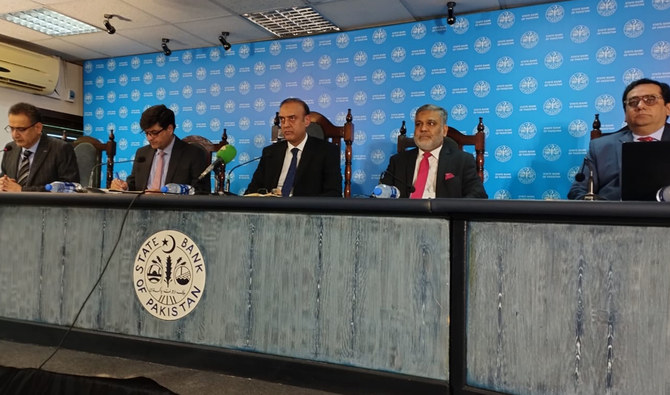KARACHI: Pakistan’s central bank on Monday kept key policy rate unchanged at 22 percent for the fifth consecutive policy meeting in a row, revising up the inflation projection for the current fiscal year.
The central bank’s decision came in line with market expectation as the Monetary Policy Committee (MPC) decided to maintain the policy rate due to frequent and sizeable adjustments in energy prices, which had slowed down the pace of decline in inflation anticipation.
“The monetary policy committee has taken decision due to elevated inflation rate which was 29.7% in December,” Jamil Ahmed, governor of the State Bank of Pakistan (SBP), said at a press conference in Karachi.
"The current stance of the central bank is appropriate."
He informed that the average inflation forecast for the current fiscal year had been increased to 23-25 percent due to the hike in the energy prices. The previous forecast was 20-22 percent.
The country’s external financial position was improving on the back of a notable surplus in the current account in December and significant financial inflows, including the latest tranche from International Monetary Fund (IMF) under a short-term financing program, according to the central bank chief.
The fiscal consolidation remained on track and complemented the tight monetary policy stance while business sentiments, as reflected in the recent surveys, continued to improve. However, the escalated geopolitical tensions in the Red Sea region have led to a surge in global freight charges and are posing risks for global trade and commodity prices.
Due to the tight monetary policy stance, the SBP governor said, around Rs400 billion were reduced from currency circulation from a total of Rs9 trillion. The inflation outlook will start declining after March, he added.
“The inflation target of 5-7 percent will now be achieved by September 2025,” Ahmed said. “The revised assessment takes into account the recent and expected adjustment in administered energy prices.”
Pakistan posted current account surplus in Dec. 2023 which helped bring down deficit by 77 percent to $0.8 billion in the first half of current fiscal year (July till December).
Ahmed said the country was comfortable on its external position due to current level of reserves and the current monetary stance was in line with the IMF recommendations, but no level had been agreed with the lender.
The governor said the signing of a new IMF program was the prerogative of the new government, which may also decide its terms and conditions and timing.
“Reserves position is comfortable after signing SBA, state bank’s forward outlook is stable, the current account deficit is sufficiently contained,” he said. “Keeping all these factors, when we would negotiate new program with the IMF, its terms would be relatively better.”
Ahmed informed that the country’s debt profile had substantially changed and it had "fully repaid" commercial loans of around $8 billion.
Besides, he said, the country had repaid one Euro bond and the next would be paid in Aril 2024 and the debt level would further reduce and there would be no further payment of Euro bond in the next fiscal year.
The total foreign debt repayment for the current fiscal year is $20.5 billion along with $3.8 billion interest payment, according to the central bank chief.
“Out of which $12 billion will be rolled over, in fact major portion has already been rolled over, including by the UAE and Saudi Arabia,” he said, adding the remaining would be rolled over in the next five months.
The governor said the country had already paid about $6 billion out of the principal amount and the remaining $5 billion had to be paid in the next five months.
















